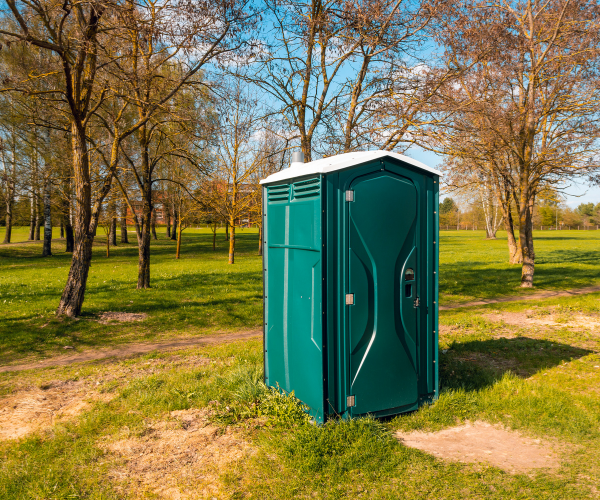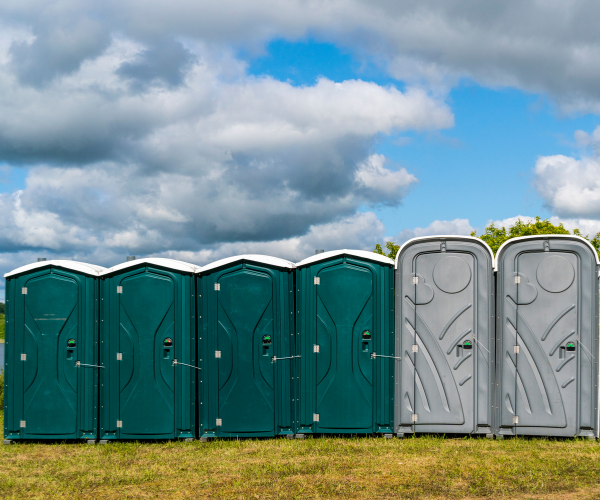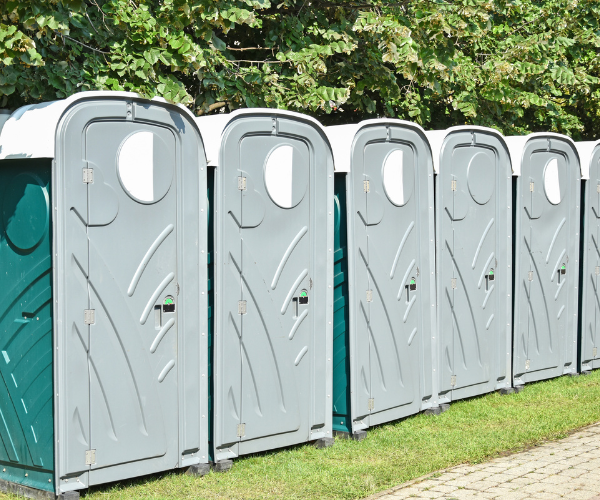Portable toilets offer a multitude of eco-friendly advantages, making them a sustainable choice for events and construction sites alike. Firstly, they significantly reduce water usage compared to traditional restroom facilities. Each unit is designed to operate with minimal water, conserving thousands of gallons over the lifetime of the unit. This is crucial in regions facing water scarcity or aiming to reduce water consumption. Additionally, portable toilets utilize innovative waste management systems that limit the ecological impact. The waste is collected and treated off-site in specialized facilities, ensuring that environmental contamination is minimized. The use of biodegradable chemicals in these systems further supports environmental sustainability.Many portable toilet units are designed and manufactured with recyclability in mind. The materials used are often recyclable, supporting circular waste management practices. Advanced portable toilet designs incorporate renewable energy sources such as solar panels to power lighting and ventilation systems, reducing reliance on traditional energy sources and decreasing overall carbon footprints.For events and locations looking to achieve green certifications or demonstrate a commitment to sustainable practices, incorporating portable toilets is a recognized method. These units often require less physical infrastructure investment, saving on raw materials and reducing the carbon emissions associated with construction and material transportation.Lastly, portable toilets contribute to maintaining cleaner outdoor environments by providing accessible sanitation options. They help reduce the risks of ground contamination at large-scale outdoor events or remote sites. By offering a managed and systematic approach to waste collection and disposal, portable toilets contribute significantly to preserving the natural state of our ecosystems.In conclusion, choosing portable toilets is not only a practical solution but an environmentally responsible one. By supporting water conservation, promoting waste recycling, and utilizing sustainable energy sources, they play a vital role in sustainable event and site management strategies.

Portable Toilet Rentals in Gordon County, Tennessee
Call today for a free quote (423) 719-5081
Portable Toilet
Fast, Easy, & 100% Free To Get Started
Over 25 Years of Excellence
With over 25 years of experience, we offer quality portable toilet services in Gordon County. Our deep community ties and unwavering commitment to superior service make us a reliable choice for all your sanitation needs.
Unmatched Quality Service
Our dedication to quality ensures that each portable toilet meets the highest standards of sanitation and comfort. We are committed to delivering excellence and reliability with every rental.
Swift Delivery Solutions
We pride ourselves on offering rapid delivery services for portable toilets, ensuring convenience for our customers. Our strategic logistics mean you can depend on us for timely and efficient services.
Quality Portable Toilet Solutions in Gordon County
Call for a Free Quote Today
(423) 719-5081
Located in the heart of Gordon County, our portable toilet company prides itself on being dependable, reliable, and locally owned. We provide top-notch sanitation solutions for a variety of events including construction sites, parties, festivals, and weddings. Our services expand beyond Gordon County, reaching nearby areas to ensure everyone has access to our top-tier amenities. With a commitment to cleanliness and timeliness, we cater to any event size and duration, ensuring every guest experiences the convenience of our portable toilets. As a locally-owned business, we understand the community's standards, and our reliable services are tailored to exceed them. Trust us for your sanitation needs, knowing we uphold the highest standards of hygiene and efficiency.


Standard Portable ToiletOur standard porta john rental units are durable and reliable for any commercial build site, housing development, public works project, or remodel job.Features include dome lighting, grated floors, and an “In-Use” locking mechanism for privacy and comfort.Regularly maintained, inspected, and cleaned by FusionSite at your location.

Wheelchair Accessible RestroomsDeveloped as an alternative to full ADA-compliant restrooms, the Liberty is a spacious, wheelchair-accessible unit that can also be promoted as a family-sized restroom.Includes a patented flat-floor system for easy wheelchair access and maneuverability.Handrails, paper holder, and rotary latch are designed for simple, intuitive end-user operation.

Portable SinkPortable hand washing stations are essential for keeping your work site sanitary and clean.Features hands-free foot pumps, liquid soap, and paper towels.Perfect for job sites without water hookups, these units can handle hundreds of washes between services.
We Proudly Serve
Standard Portable Toilets
Our standard portable toilets in Tennessee offer convenient, clean sanitation solutions for any event or job site.
High Rise Portable Toilets
Our high-rise portable toilets in Gordon County cater to construction and multi-story building projects, ensuring accessible sanitation.
Restroom Trailers
At The Bolles Co, our restroom trailers in Gordon County bring luxury and convenience to any event setting.
Roll off Dumpsters
The Bolles Co provides reliable roll-off dumpsters in Gordon County, ideal for efficient waste management across various sites.
Septic Tank Cleaning
In Tennessee, our septic tank cleaning services at The Bolles Co ensure efficient maintenance and performance.
Grease Trap Cleaning
We offer specialized grease trap cleaning services in Gordon County, Tennessee, ensuring optimal performance and compliance.
Fencing & Barricades
Operating in Tennessee, The Bolles Co offers fencing and barricades services for secure and organized event layouts.
Residential Storage
Our residential storage units in Gordon County, Tennessee, provide a safe and secure solution for your household storage needs.
Gordon County Portable Toilet and Event Services
Getting a quote for our portable toilet services is seamless, ensuring convenience right from the start. Customers in Gordon County can easily access our services by navigating to our dedicated online quote form. This tool streamlines the inquiry process by prompting for straightforward information such as name, contact number, and email. Once the details are submitted, our team promptly reviews the requests to provide customized solutions tailored to individual needs. Our priority remains to make the entire process as efficient and stress-free as possible, ensuring that each customer's specific needs are addressed with precision.Once your quote is complete, the delivery process is executed with precision and reliability. Our experienced crew ensures the portable toilets arrive at your location promptly, adhering to the highest standards of customer satisfaction. We understand the importance of time-sensitive deliveries, particularly for large-scale events or construction sites. Our fleet of delivery vehicles is strategically equipped to handle various terrains and locations, confirming our reputation for dependability.We also offer various models and options to suit diverse preferences and requirements, from basic units to luxury restroom trailers. Our extensive inventory ensures that no matter the scale or style of your event, we have the perfect solution ready for deployment. Further, our competitive pricing guarantees value, maintaining high standards without compromising on quality. Whether you oversee a construction project or plan a community festival, our tailored rental services cover every aspect from initial quote to final delivery. Choosing our portable toilets means opting for hassle-free, efficient, and reliable vendor services that cater to your unique location and needs. Experience firsthand why we're the trusted choice for sanitation excellence in Gordon County and beyond.

In Gordon County, home to the picturesque Red Clay State Park and the bustling Annual Calhoun County Fair, our portable toilets elevate outdoor events by seamlessly integrating with the area's vibrant life and natural allure. As the region's go-to provider, we tailor our offerings to meet local demands, guaranteeing cleanliness and dependability for every occasion. Whether at a lively community gathering or amidst the tranquil settings of local parks, our portable toilets offer utmost convenience. From outdoor weddings to these beloved festivals, we provide sanitation solutions that naturally fit any environment. Our dedication to the community goes beyond service—it's about enhancing experiences while honoring local charm. As a locally owned company, we strive to furnish every event in Gordon County with the essential amenities, ensuring guests enjoy maximum comfort and satisfaction.
Top Choice for QualityIn Gordon County, our portable toilet company distinguishes itself as the premier option through our steadfast commitment to superior service and community engagement. We focus on customer satisfaction, making each interaction both pleasant and professional.Local Expertise, Unmatched ServiceOur deep connection to the area enables us to understand our clients' specific needs, providing tailored solutions with a personal touch. Whether supporting construction projects or weddings, trust us to elevate your event with exceptional sanitation standards.
Reliable and Fast ServiceOur portable toilet company stands for swift, dependable service across Gordon County. Recognizing the urgency tied to our rentals, we've refined our delivery system to ensure each unit reaches you promptly and impeccably maintained.Local ExpertiseAs a trusted local provider, we combine community insight with unwavering commitment, ensuring reliability in every transaction. Our main goal is to surpass customer expectations by offering fast and thorough portable toilet solutions tailored to varied requirements.
Learn More About Our Portable Toilets in Gordon County
Renting a portable toilet in Gordon County is a straightforward process with The Bolles Co. Start by visiting our website, where you'll find our user-friendly forms at both the top and bottom of the page. These forms are designed to make the booking process seamless. Simply fill out the required fields: your first name, last name, phone number, and email address. For added convenience, our 'Get A Quote' buttons, prominently displayed throughout the site, provide quick access to our services with just a click. Once your details are submitted, our dedicated team promptly reviews your request to offer a tailored quote that suits your specific needs.Our streamlined services ensure you receive prompt responses and accurate information. After receiving your quote, you can select the types and number of portable toilets you require, ensuring your event has adequate sanitation support. The final step involves confirming your order, upon which our team coordinates the delivery and setup according to your preferred schedule and location.The hassle-free process is designed to prioritize customer convenience and satisfaction. Rest assured, our knowledgeable staff is available to assist at any step, ensuring clarity and responsiveness.At The Bolles Co, efficiency is at the heart of all our operations, making renting a portable toilet in Gordon County an effortless experience, ready to meet the demands of any event, from small gatherings to large corporate or community functions.
Understanding the timeframe for portable toilet delivery is fundamental when planning any event or project requiring sanitation facilities. At The Bolles Co, we pride ourselves on prompt and efficient service, ensuring that portable toilet units arrive when our clients need them. Typical delivery times may vary based on location, the volume of units ordered, and current demand. However, once an order is confirmed, our team prioritizes immediate scheduling, often achieving delivery within 24 to 48 hours.For events that require set schedules, such as festivals or weddings, our logistics team works closely with organizers to accommodate specific timelines, ensuring a smooth setup process. Construction projects, which often demand flexible delivery times, also benefit from our adaptable logistics capabilities, providing reliable delivery that's tailored to meet the unique demands of each site.Should any timeline adjustments need to be made, our customer service team promptly communicates potential changes, maintaining transparency throughout the delivery process. Our commitment to superior service includes ongoing support and communication from order confirmation to delivery.Clients can expect frequent updates and support throughout the rental process, ensuring that adjustments, if needed, are smooth and minimally disruptive. By offering consistent communication and reliable service, The Bolles Co ensures that all portable toilet deliveries meet client expectations, regardless of the scale or scope of their need.Ultimately, delivering on time is our top priority, helping us maintain the strong reputation for reliability and responsiveness that our clients have come to expect.
Absolutely, we are equipped and prepared to service any type of event or construction site with our portable toilets. At The Bolles Co, we pride ourselves on versatility and comprehensiveness in meeting a wide range of needs. Whether you are planning a large festival, an intimate wedding, or a corporate event, our extensive selection of sanitation solutions ensures we have the right fit for your occasion. Our inventory includes luxury restroom trailers, standard porta potties, and specialty units such as ADA-compliant and high-rise toilets. In addition to portable toilets, we offer roll-off dumpsters, fencing, barricades, holding tanks, portable sinks, and hand sanitizer stations, allowing us to provide a complete sanitary environment for any setting. Our experienced team works closely with event planners and construction managers to tailor our services to the particulars of your site or venue. Our comprehensive approach ensures that each event or project receives the appropriate support, maximizing both convenience and satisfaction for all stakeholders. By choosing us, you can be confident that you are receiving not only top-tier products but also exceptional service. We consistently strive to exceed expectations by providing solutions that are as hassle-free as they are effective, reinforcing our position as a trusted provider in Gordon County and beyond.

